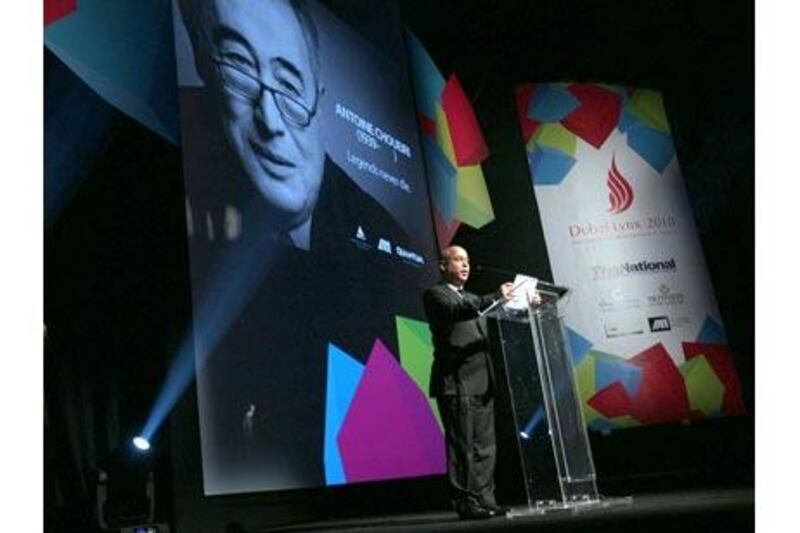When the founder of the Choueiri advertising giant died in March, he left his son Pierre a difficult challenge. Will he be able to replace the man who established the model for Middle East advertising? asks Ben Flanagan If the late Antoine Choueiri built the foundations of the Middle East's advertising industry, what can you build on top of that? For industry insiders, that is the big question facing Pierre Choueiri, 45, who took over as head of the Choueiri Group after the death of his father in March.
The late Antoine formed the company in 1970 and at the height of his powers he controlled the flow of advertising to most of the top free-to-air television stations in the region, including MBC, LBC, Al Jazeera and Dubai Media Incorporated. His legacy is a lot to live up to. He was described variously as the "founding father" and the "architect" of the Arab world's advertising industry, and was credited with pioneering the media model in the region under which TV and radio stations and newspapers outsource their ad sales operations.
Tributes to Antoine poured in after his death on March 9, following a long battle with cancer. His friends and associates spoke of his ambition, business acumen and generosity. Others said that no one was indifferent to Mr Choueiri. "He was the kind of person you either love or hate," says Mazen Hayek, the director of PR and commercial for the MBC Group, which is one of Choueiri Group's biggest partners.
But despite the reverence of many of the tributes, some questioned the Choueiri Group's business stance. Industry commentators pointed to the company's alleged monopoly abuse and the large commissions it charged. Jayant Bhargava, a principal at the consultancy Booz and Company, told The National this year that Choueiri Group commissions were more than four times those in more developed markets. But despite these issues, the main concern now is what the Choueiri Group will do without its founding father.
More of the same, says Pierre Choueiri, who now leads the company even though he does not have a "job title". "As long as we have the confidence of the media owners, nothing will change," he adds. "And I am confident that this will continue in the future." Preserving the group's relationship between the three controlling forces in the media - advertisers, media buying units and publishers - is essential. "It's very important to preserve that golden triangle," Mr Choueiri says. "We need them and they need us to grow the industry."
Despite his confidence, he will have to keep a close eye on the group's competitors. In 2008 the firm lost a lucrative contract to represent the sales operations of the Lebanese broadcaster LBC. Could more losses be on the cards? Austyn Allison, the managing editor of Communicate, a Dubai-based media and marketing magazine, believes it is only natural that rivals will be looking for the Choueiri Group's business.
"I don't think that's any surprise as Choueiri has the biggest slice of the pie," says Mr Allison. "There are other media representation groups that would like to get hold of the Choueiri prize but I don't think they're going to be over-predatory. "We're bound to see some shift over the next few years but I don't think the Choueiri Group will lose its place as one of the major players in the media industry. Nobody is on a scale close to Choueiri."
This sentiment is echoed by Mr Hayek of MBC: "With [17] TV stations in a market with 600 channels, you could say they do [have competition]. But if you look at the ratings and commercial billings, they are a dominant force. "It will not change because advertisers and MBUs [media buying units] are businessmen and businesswomen … they put their money where they get the highest ROI [return on investment]. Pierre was running the show on a daily basis for the past two years so it's not news for us."
But there will be some changes. Jamale Rassi, a former partner in the Choueiri Group and now the general manager of Adline, a media marketing network based in Beirut, says Antoine had a unique touch with the advertising agencies and media buying units. "Antoine used to federate the agencies around him," says Ms Rassi, who worked with him for 16 years. "This was something only Antoine [could do]. Now there's a vacuum on the agency side.
"Not that [the agencies] were doing bad things; but now, there is no authority. No one can replace Antoine in this respect. When you handle US$1 billion [Dh3.67bn], you have an authority. People used to listen to what he said. And usually, what he said wasn't stupid." But Ms Rassi feels the Choueiri Group still has the muscle to see off rivals. "I'm sure they will not lose [clients]," she says. "They have a lot of financial power to counter any aggression they will face. I don't think they will face problems for at least five to seven years. In my opinion, they will strive to become better."
But the issue of personality remains, says Mr Allison. "One of the things people said was that it was a business built on the culture of personality, it was more about Antoine Choueiri than the Choueiri Group," he says. "But they are now commercially strong enough to command the respect that Antoine Choueiri commanded as a person. [Pierre] and the company still carry a lot of the respect that his father built up."
Even so, comparisons between the two Choueiris will be inevitable. Pierre recognises that and says he shares some essential attributes with his father. "Definitely there is a certain philosophy, and a certain common ground. I was working alongside [my father] for 25 years," he adds. "So I am a very lucky person." bflanagan@thenational.ae





